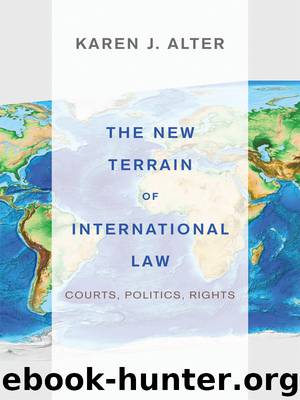The New Terrain of International Law by Alter Karen

Author:Alter, Karen
Language: eng
Format: epub
Publisher: Princeton University Press
Published: 2014-04-08T04:00:00+00:00
III. THE ALTERED POLITICS OF INTERNATIONAL ADMINISTRATIVE REVIEW
Administrative review is also a mostly other-binding role, where governments, judges, and administrators largely share an interest in seeing regulatory rules correctly applied. Administrative review should exert its greatest influence through prophylactic improvements in administrative process and decision making, and by decreasing litigation once ICs have filled legal lacunae, addressed conflicts, and facilitated a uniform application of existing rules. Scholars have credited the ECJ and the ATJ with such contributions,105 and even the NAFTA system is seen as leading to better factual records and improved transparency in administrative decision making.106
This book is concerned with how ICs induce greater respect for international law by influencing state decision making and international relations. Figure 6.2 maps IC influence over those actors with the power to choose compliance, applying the altered politics framework. Arrows indicate pressure to influence the key compliance partner.
During the bargaining phase (T1), the administrators made their decision. For the ECJ, Andean, and NAFTA systems, it was clear that controversial administrative decisions would be subject to administrative review. The European Commission made sure that it faithfully adhered to the ECJ’s legal requirements. It solicited input from European competitors and justified its decisions in detail. Since the Commission’s actions were likely to be upheld, the prospect of review generated very little leverage for Microsoft, General Electric, or Honeywell. Microsoft complied with the Commission’s decision, but did challenge a Commission fine added because of a delay in releasing programing information. Microsoft lost, however, and ultimately it acceded to the Commission’s demands.
Firms had more leverage in the Andean case study, but primarily because the legal rules and their interpretation were in flux. In T1 Bigott worked with Venezuelan officials to influence both the creation of Andean rules and Colombian interpretations of existing Andean law. Once Andean rules were in place, litigation politics in T2 aimed at influencing ATJ’s interpretation of these rules. Bigott got Colombia to intervene in Venezuela’s noncompliance suit against Ecuador, but the Venezuelan efforts failed to reverse Ecuador’s decision to award the Belmont trademark to Bigott’s rival. One can presume that firm pressure led the Columbian executive to issue its decree clarifying how Andean rules should be understood in Colombia. This clarification then influenced the ATJ as it responded to the preliminary ruling reference by the Consejo de Estado. Political maneuvering in both the European and Andean cases ended after the relevant legal rulings because the key administrators complied in full with supranational legal requirements.
FIGURE 6.2 Political dynamics of international administrative review
Download
This site does not store any files on its server. We only index and link to content provided by other sites. Please contact the content providers to delete copyright contents if any and email us, we'll remove relevant links or contents immediately.
The Pirates of Somalia by Jay Bahadur(1625)
Political Theology by Carl Schmitt(1577)
The Holocaust: A New History by Laurence Rees(1521)
The Social Animal by David Brooks(1452)
A Practical Guide to International Arbitration in London by Hilary Heilbron(1434)
Restitution by Restitution(1424)
Pirates of Somalia by Jay Bahadur(1381)
Coercing Virtue by Robert H. Bork(1357)
The Nuremberg Interviews by Leon Goldensohn(1304)
Basic International Corporate Taxation by Sebastiano Garufi(1214)
A History Of Thailand by Baker Chris(1190)
International Trade and Business: Law, Policy and Ethics by Gabriël Moens & Peter Gillies(1137)
The Global Commons by Susan J. Buck(1137)
The Sovereignty of Human Rights by Macklem Patrick(1113)
Blood Profits by Vanessa Neumann(1113)
Asian Waters by Humphrey Hawksley(1113)
Spring Fever: The Illusion of Islamic Democracy by McCarthy Andrew C(1102)
The Nuremberg Trials: The Nazis and their Crimes Against Humanity by Roland Paul(1045)
Crimes Against Humanity: Historical Evolution and Contemporary Application by M. Cherif Bassiouni(1028)
